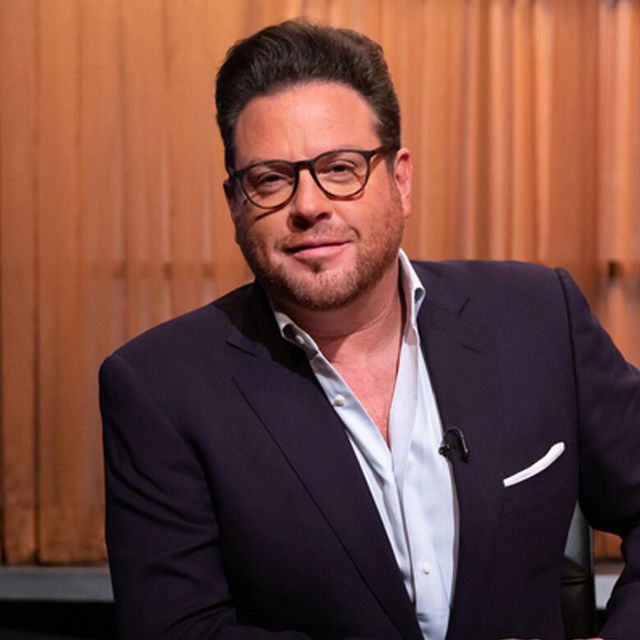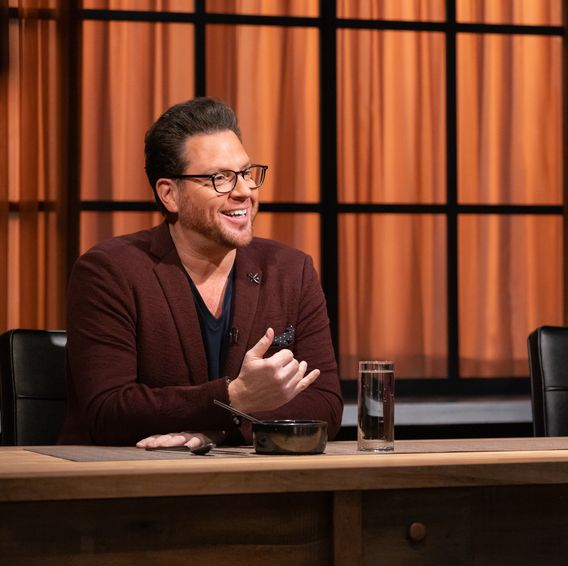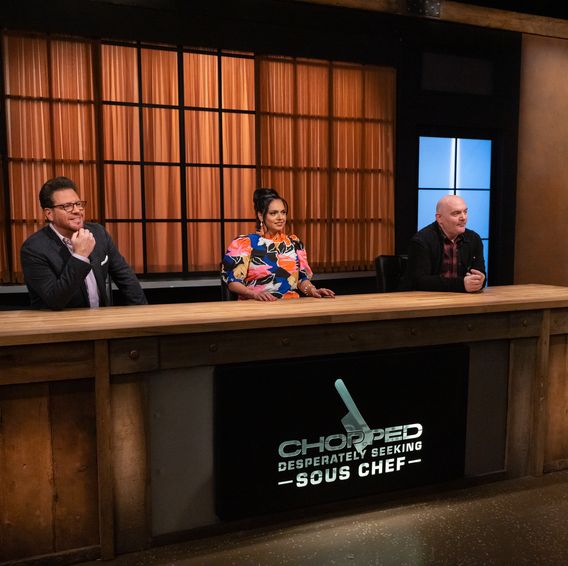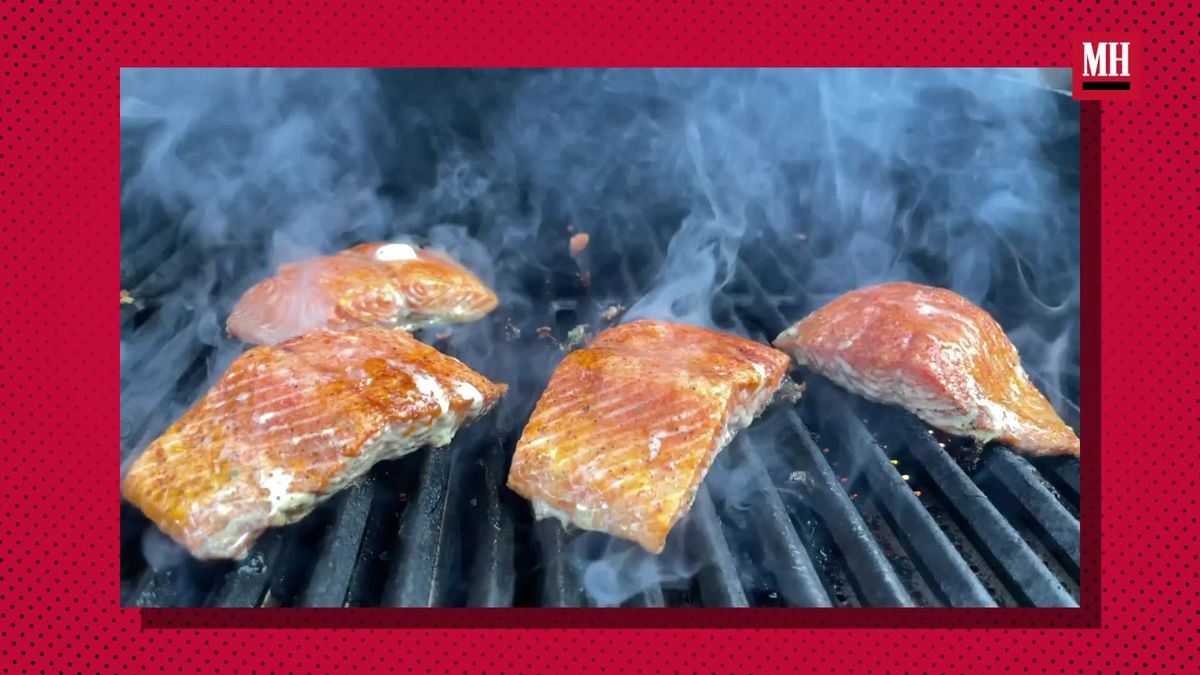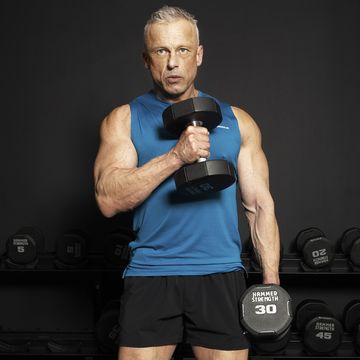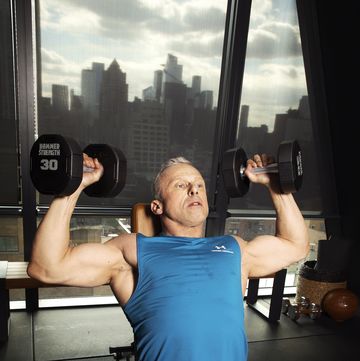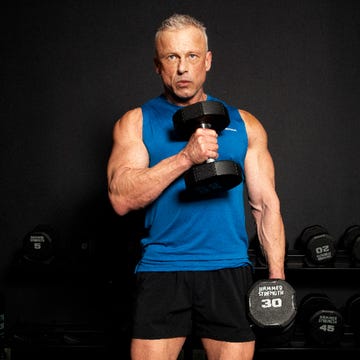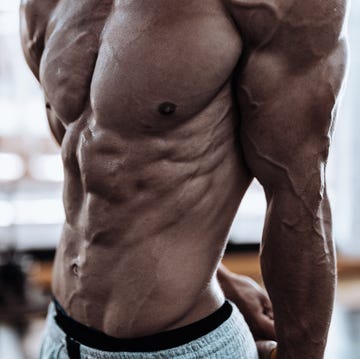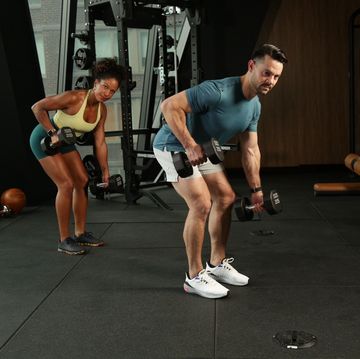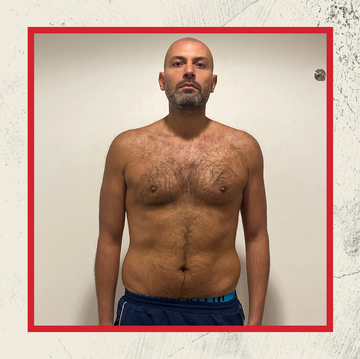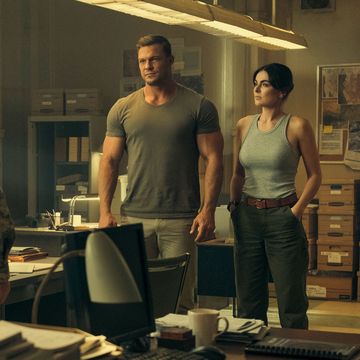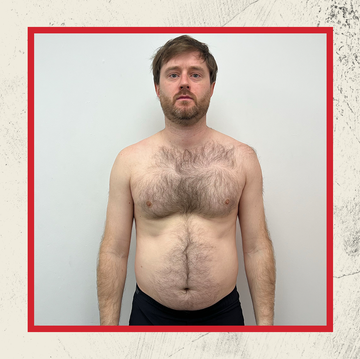WHAT DO YOU get when you mix shrimp, asparagus, a blueberry waffle, and a can of haggis? Or, donuts, coconuts, cocktail sauce, and cod milt (that is, the fish’s sperm sac)? For most of us, a bout of nausea—but to the judges of Food Network’s Chopped, something usually edible and sometimes delectable, prepared by some of the country’s best chefs.
That’s nothing new to fans of the show, on which chefs showcase their abilities to fashion a mishmash of bold and peculiar ingredients into restaurant-quality dishes against the clock. On the judges’ panel since Season One has been award-winning chef Scott Conant, who runs a portfolio of restaurants in New York, Atlanta, and Scottsdale, Arizona, where he now lives. None of them, unsurprisingly, include tuna jerky in their desserts.
Now in its 14th year and 54th season, Chopped has continued strong even with the rise of blockbusters like Masterchef and The Great British Bake-Off, all following a similar celebrity chef judge format. I speak to Conant as he calls in from Oaxaca, Mexico, the sun blazing down as he sports shades and a linen shirt unbuttoned most of the way down. “This is not an average day in the life,” he tells me, grinning. “I don't want to get it misconstrued.”
Conant opens up about a day in the life of a TV judge, discussing how he preps for the greasiest dishes, what an “emergency tasting” is, what happens to the food that isn’t eaten—and how he handles the occasional fledgling contestant who behaves “like a jackass.”
MH: How does the filming schedule work for an episode of Chopped? Are you doing all three courses on the same day?
SC: They'll pick us up around 6:30, 7 o'clock in the morning; [we] get to the set, go through hair and makeup. Normally, they'll start shooting by 8:30, 9 o'clock with the first course. I always feel like people think there's a certain glamour that goes along with shooting some of these shows. And let me tell you something: it's a blessing. I’m truly full of gratitude for being able to do this for so long. But sometimes when you're waking up, and I'm an espresso person so I'm drinking espresso—and then we have a plate of lamb testicles that we have to eat at 9am. It really takes the glamour out of it a little.
So you don't normally have that with your espresso?
(Laughs) Yeah, that's not a normal thing. We'll shoot all three rounds on the same day. And depending on if it's a special occasion, or what we call some kind of tournament, the day can go from 10 to maybe 14 hours. So it's a long day of eating a lot of food. A lot of things you wouldn't normally put together.
The main course will come around 12:30, 1 o'clock. After that we'll break for lunch, which normally we'll have a green juice or something like that just because it's so much food. And then dessert happens around 3:30, 4 o'clock.
Does the schedule feel like a shock to the system compared to your off-days?
I'm not a breakfast eater. I drink coffee until around noonish, and then I'll probably have my first bite to eat on an average day at about one o'clock. I wouldn't say it's a shock to the system. But you know, it could be a lot—considering it's four appetizers, [though] of course we don't have to eat everything.
Are you normally still in the mood for dinner after a daylong shoot?
It's such a weird feeling because you're kind of full, but not quite. If you speak to a nutritionist, they'll say your body craves food when it hasn't had proper nutrients. So what I tend to do at night is maybe have a big salad, so I can have some vegetables. I'm not as young as I used to be so the digestion process needs some altering. I gotta control what I can.
What do you do in the off-time between courses?
I tell a lot of jokes. I like to think I'm the funny one. Everyone else is gonna disagree with me.
We talk about our lives. The initial group of us—me and Alex [Guarnaschelli] and Amanda [Freitag], and Geoffrey [Zakarian], Marc [Murphy], Chris [Santos]—the core group of us has been there for about 14 years. Sharing each other's trials and tribulations in business has always been a lot of fun. Like: ‘What are you working on now? This is my experience with doing what you're doing.’ We're always learning from one another.
You don’t seem to interact with the chefs during the cooking segments as much as on other cooking shows. How do you know what they’re making?
A lot of times, they'll put another monitor in front of us because we can't see everything that's going on. Sometimes we'll go in; a lot of times it gets edited out because it's so frenzied when the chefs are cooking.
Every single chef who’s come into that kitchen has said it's so much more difficult than it looks on TV. There's no time when you're in the kitchen to press pause. There's about a three-minute timeframe where they open the baskets, they reset everything to reshoot it a second time [for photography purposes]—and then they're off to the races.
I mean, it already looks insanely difficult on TV.
Yeah, it’s fun though. The learning process is incredible. There's so many ingredients that we just have never worked with before. So we're able to identify new ingredients; we're able to see how they're meant to work together. Normally that research and development process is something we have to do in our restaurants.
Do you know what the ingredients are before the chefs open the baskets?
[Culinary Producer] Sara Hormi has been doing every single basket since the first season. I don’t know how she does it. Some of the other kookier ingredients, she spends a tremendous amount of time trying to identify those things. [The judges] have nothing to do with the baskets, unfortunately. I think we'd probably pick prime rib and foie gras if it were up to us.
It sounds like a fun job, and a lot of power over you guys.
There's probably a lot of people who are trying to get in touch with her so they could do product placement. She could probably have a whole side hustle if she were into that.
I guess haggis in a can needs a bit of marketing help.
That's a good point.
How much of a dish are you typically eating? Do you ever just eat the whole thing because it's so good?
It's happened that the chef put these things together in a way that’s so good that we can't help ourselves. That's frankly a rarity. I don't want to speak out of turn, but we've had some fans of the show come on [who are] not chefs. And shockingly they've done as well, if not better, than a lot of professional chefs. It's really less about being a chef and it's more about putting a puzzle together, and utilizing these food products as pieces of the puzzle.
A lot of times you have something that's sweet and you turn it into some kind of a gastrique, where it has a little sweet and a little sour note, and you can make that into a sauce. You have a protein, which is really about cooking [it] the right way in the time allotted. Then you have some kind of vegetable, and then there's one kind of foreign ingredient, like a piece of durian, or something kooky. If you have a processed ingredient like potato chips, you normally want to take a fresh ingredient to amp up that fresh flavor, if that makes sense? It’s early and I haven't had a lot of coffee yet.
And you haven’t had your lamb testicles, either.
(Laughs) That's right. Good point.
I read somewhere that the dishes are sometimes cold when they get to you?
More often than not, because of the way the shooting goes. Sometimes they'll do what we call ‘emergency tastings,’ if the chef's done a soufflé or something that really needs to be eaten right away. We're professionals: we can identify what it's meant to taste like if it's a little bit cold. I don't know a single chef in the restaurant world who's accustomed to eating hot food hot. There's just too much to do in a restaurant.
If you're taking a few bites of each dish, what happens to the rest? Does it essentially just go to waste?
On many occasions, you're kind of happy that it's going to waste because it's not particularly good.
I mean, inevitably on a lot of these shows, there's a lot of waste. There are occasions where the crew wants to try something. But normally anything that goes unused or that's not partially eaten, they have relationships with various food banks, so they can go to people who are hungry. You can't, in your own good conscience, waste that food. Otherwise, karmically, it's bad.
Do you ever balk at eating something? Are you ever just like, I can't put this fork to my mouth?
By dessert, it becomes arduous. But these are high-class problems. I don't want to sound like I'm really getting through the day, like it's so tough. It's a pretty good gig. I'll take it.
Definitely. But especially when there’s a lot of greasy stuff, a lot of oily stuff, that's still something you’ve got to deal with.
Oh it is, 100 percent. I'm in my 50s now; I have to be careful. [When it’s] Deep Fried Day, it's like, oh my god, we have to eat nine plates of deep-fried food. My stomach turns just thinking about it. But for a lot of these chefs, if they’re thoughtful about what they’re doing, they could create something deep fried, but also create a balance of something that's fresh, something that's highly acidic, something that's going to cut through that fat.
Do you have any standout examples of items you’ve especially loved or hated?
I love food: it’s why I got into cooking. I took my first classes when I was 11, and I've been doing this for over 40 years now. So I would be lying to you if I said that I don't still get excited about the food that's in front of me—good, bad, or indifferent. There's always something positive on the plate that the chef has done. I can't think of anything off the top of my head that has been totally off-putting. And I don't take stuff like that personally, because that creative process doesn't always work the same way for everybody.
The number-one competitor I've ever experienced was a chef named Demetrio [Zavala], who lives in South Florida. He cooked like an angel. I remember eating his food and just being completely floored. I mean, literally getting up from the table and hugging him. [He was] really hypersensitive to the cooking process—even his presentations were always buttoned-up and spectacular. A tremendous chef. Tremendous.
In the days leading up to filming, do you do any kind of prep?
I rarely eat the night before a shoot. A lot of times if I come into town and I see friends—Marc Murphy and I will have dinner together—I try to go easy, because I know that I have a big day of eating the next day. And also, I don't want to look swollen on camera. I’m a pretty vain guy. I just want to make sure I look okay, that's the most important thing.
You made it work today, for sure.
Well, the Mexican sun has this effect.
You've guest-judged on other shows, including Top Chef and Iron Chef. How do they compare to Chopped in terms of the tasting process?
I'll tell you what I love about Chopped: the producers let us be who we are. They let us make the decision on who the chef winner is, unlike on other shows—I'm not going to name the shows. The integrity of Chopped is something that's been really important to me from day one; I didn't want to be beholden to the whims of the producer about who's going to show best, as opposed to who's the best chef. I don't care about the personalities or smugness. I care about what's on the plate. Whether or not this person is likable, they'll deal with that the rest of their life.
Other shows tend to have a ‘mean guy,’ like Gordon Ramsay on Masterchef. On Chopped, all the judges have their own personalities, but everyone is pretty fair. Would you agree with that?
Well that's nice to hear, because most people call me the mean guy. I like to think that I'm firm but fair. If somebody misbehaves, somebody's acting like a jackass, I'm going to let them know. I'm going to call them out on disrespecting the process, disrespecting the staff. That happens sometimes: you get a lot of younger chefs, they’re a little uncomfortable, so they act a particular way. We had a situation a couple of weeks ago where I just said to this particular chef: “I know your chef. I don't think you want me to call him and let him know how you were disrespecting this crew.” I look for stuff like that, because I think that it's gonna set people straight. It's gonna make them better cooks.
That seems more like sharing wise words from your experience than just being a mean guy for the camera.
I'm never mean for the sake of being mean. I'm a father of two young daughters, 12 and 10. I'm gonna treat people as if my kids are watching. Everyone should be on their best behavior, myself included. Maybe Ted [Allen] can get away with it, because he's the host. He can do whatever he wants.
The judges chop and change with each episode. Is that basically due to everyone’s schedules?
Amy [Stanford, the showrunner], takes care of the schedule. She's a joy to work with, but I wouldn't want her job. Our schedules are very different from what they used to be. The majority of us are around the country: Chris lives in LA, I live in Scottsdale, Maneet [Chauhan] lives in Nashville. We're scattered throughout the country at this point, and it's the show that has taken our careers to a different level. So I think it's really important that we stay true to what we've always been on that show, which is available.
It's been a blessing to be able to do it for so long. We've created a family together, judges and crew alike. We all stay in touch. You know on your phone where you have family members in your photo files? I have as many photos of people from Chopped as I do my own children.
I hope your kids are okay with that.
There's nothing like the love of your children. They know they’re first. I tell them all the time.
